JUST IN - IN FAVOR

Feature of the Week October 19, 2017

by Brian Blum
The Tesla 3 has grabbed the spotlight as the first “affordable” all-electric vehicle, but Israel’s Better Place came first.
The plan was to use Israel — a country the size of New Jersey and dubbed “the Startup Nation” — to prove electric cars could work everywhere. Instead of fast charge, Better Place addressed range anxiety by building a network of battery-swap stations — operated by robots.Better Place’s charismatic CEO Shai Agassi believed his company’s innovative technology could help stop climate change and free nations from the yoke of oil dependence. His magnetic television appearances, viral TED Talk and compelling boardroom presence had investors and business leaders worldwide jumping in to ride shotgun. Countries from Japan to Denmark to Australia signed on and the privately-held Better Place raised nearly a billion dollars.
Yet in a few years, it was all over — the company, buffeted by internal strife, an international corporate spy scandal, the Great Recession and technology disruptions, went bankrupt. The story of the “electric car unicorn that collapsed” is a cautionary tale; a timely case study filled with valuable lessons for entrepreneurs, investors and executives in businesses of all sizes — as well as everyone chasing the electric car Holy Grail.
TOTALED plunges deep into the riveting rise and fall of a company that sincerely wanted to change the world but couldn’t quite get to the finish line.
Feature of the Week August 10, 2017

by Adam Lashinsky
Before Travis Kalanick became famous as the public face of Uber, he was a scrappy, rough-edged, loose-lipped entrepreneur. And even after taking Uber from the germ of an idea to a $69 billion global transportation behemoth, he still describes his company as a start-up. Like other Silicon Valley icons such as Steve Jobs and Elon Musk, he’s always focused on the next disruptive innovation and the next world to conquer.
Both Uber and Kalanick have acquired a reputation for being combative, relentless, and iron-fisted against competitors. They’ve inspired both admiration and loathing as they’ve flouted government regulators, thrown the taxi industry into a tailspin, and stirred controversy over possible exploitation of drivers. They’ve even reshaped the deeply ingrained consumer behavior of not accepting a ride from a stranger—against the childhood warnings from everyone’s parents.
Wild Ride is the first truly inside look at Uber’s global empire. Veteran journalist Adam Lashinsky, the bestselling author of Inside Apple, traces the origins of Kalanick’s massive ambitions in his humble roots, and he explores Uber’s murky beginnings and the wild ride of its rapid growth and expansion into different industries.

Feature of the Week August 1, 2017
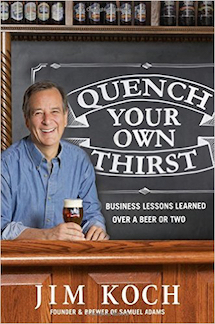
by Jim Koch
Founder of The Boston Beer Company, brewer of Samuel Adams Boston Lager, and a key catalyst of the American craft beer revolution, Jim Koch offers his unique perspective when it comes to business, beer, and turning your passion into a successful company or career.
In 1984, it looked like an unwinnable David and Goliath struggle: one guy against the mammoth American beer industry. When others scoffed at Jim Koch’s plan to leave his consulting job and start a brewery that would challenge American palates, he chose a nineteenth-century family recipe and launched Samuel Adams. Now one of America’s leading craft breweries, Samuel Adams has redefined the way Americans think about beer and helped spur a craft beer revolution.
In Quench Your Own Thirst, Koch offers unprecedented insights into the whirlwind ride from scrappy start-up to thriving public company. His innovative business model and refreshingly frank stories offer counterintuitive lessons that you can apply to business and to life.
Feature of the Week July 18, 2017
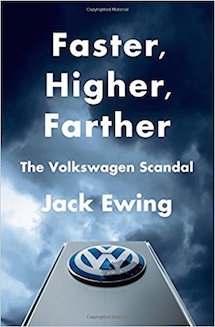
Faster, Higher, Farther: The Volkswagen Scandal
by Jack Ewing
A shocking exposé of Volkswagen’s fraud by the New York Times reporter who covered the scandal.
In mid-2015, Volkswagen proudly reached its goal of surpassing Toyota as the world’s largest automaker. A few months later, the EPA disclosed that Volkswagen had installed software in 11 million cars that deceived emissions-testing mechanisms. By early 2017, VW had settled with American regulators and car owners for $20 billion, with additional lawsuits still looming. In Faster, Higher, Farther, Jack Ewing rips the lid off the conspiracy. He describes VW’s rise from “the people’s car” during the Nazi era to one of Germany’s most prestigious and important global brands, touted for being “green.” He paints vivid portraits of Volkswagen chairman Ferdinand Piëch and chief executive Martin Winterkorn, arguing that the corporate culture they fostered drove employees, working feverishly in pursuit of impossible sales targets, to illegal methods.
Feature of the Week June 27, 2017
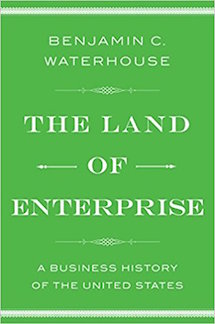
The Land of Enterprise: A Business History of the United States
by Benjamin Waterhouse
A new, gripping history of America—told through the executives, bankers, farmers, and politicians who paved the way from colonial times to the present—reveals that this country was founded as much on the search for wealth and prosperity as the desire for freedom.
The Land of Enterprise charts the development of American business from the colonial period to the present. It explores the nation’s evolving economic, social, and political landscape by examining how different types of enterprising activities rose and fell, how new labor and production technologies supplanted old ones—and at what costs—and how Americans of all stripes responded to the tumultuous world of business. In particular, historian Benjamin Waterhouse highlights the changes in business practices, the development of different industries and sectors, and the complex relationship between business and national politics.
Feature of the Week May 11, 2017
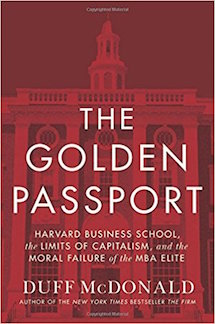
The Golden Passport: Harvard Business School, the Limits of Capitalism, and the Moral Failure of the MBA Elite
by Duff McDonald
In The Golden Passport, McDonald reveals the inner workings of a singular nexus of power, ambition, and influence: Harvard Business School. Harvard University occupies a unique place in the public’s imagination, but HBS has arguably eclipsed its parent in terms of its influence on modern society. A Harvard degree guarantees respect. An HBS degree is, as the New York Times proclaimed in 1978, “the golden passport to life in the upper class.” Those holding Harvard MBAs are near-guaranteed entrance into Western capitalism’s most powerful realm—the corner office.
Most people have a vague knowledge of the power of the HBS network, but few understand the dynamics that have made HBS an indestructible and powerful force for almost a century. As McDonald explores these dynamics, he also reveals how, despite HBS’s enormous success, it has failed with respect to the stated goal of its founders: “the multiplication of men who will handle their current business problems in socially constructive ways.” While HBS graduates tend to be very good at whatever they do, that is rarely the doing of good.
Feature of the Week April 18, 2017
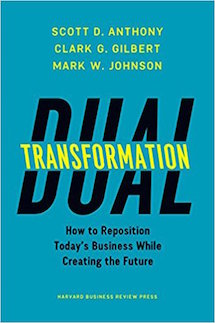
Dual Transformation: How to Reposition Today’s Business While Creating the Future
by Scott Anthony
In Dual Transformation, Scott Anthony, Clark Gilbert, and Mark Johnson propose a practical and sustainable approach to one of the greatest challenges facing leaders today: transforming your business in the face of imminent disruption. Dual Transformation shows you how your company can come out of a market shift stronger and more profitable, because the threat of disruption is also the greatest opportunity a leadership team will ever face. Disruptive change opens a window of opportunity to create massive new markets. It is the moment when a market also-ran can become a market leader. It is the moment when business legacies are created.
Feature of the Week March 14, 2017
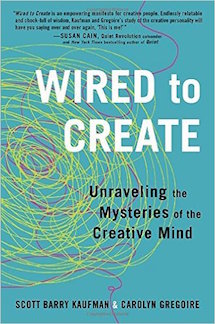
Wired to Create: Unraveling the Mysteries of the Creative Mind
Is it possible to make sense of something as elusive as creativity? Based on psychologist Scott Barry Kaufman’s groundbreaking research and Carolyn Gregoire’s popular article in the Huffington Post, Wired to Create offers a glimpse inside the “messy minds” of highly creative people. Revealing the latest findings in neuroscience and psychology, along with engaging examples of artists and innovators throughout history, the book shines a light on the practices and habits of mind that promote creative thinking. Kaufman and Gregoire untangle a series of paradoxes— like mindfulness and daydreaming, seriousness and play, openness and sensitivity, and solitude and collaboration – to show that it is by embracing our own contradictions that we are able to tap into our deepest creativity. Each chapter explores one of the ten attributes and habits of highly creative people:
Imaginative Play * Passion * Daydreaming * Solitude * Intuition * Openness to Experience * Mindfulness * Sensitivity * Turning Adversity into Advantage * Thinking Differently
Feature of the Week March 7, 2017
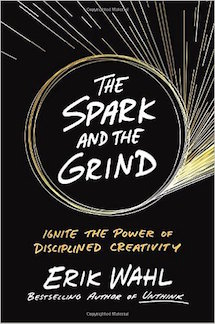
The Spark and the Grind: Ignite the Power of Disciplined Creativity
by Erik Wahl
We’ve been conditioned to think about creative genius as a dichotomy: dreamers versus doers, creativity versus discipline, the spark versus the grind. But what if we’re wrong? What if it’s the spark and the grind?
We love people whose creative genius arrives in sudden sparks of inspiration. Think of Archimedes in his bathtub or Newton under his apple tree.
But we also admire people who work incredibly hard and long for their creative breakthroughs. Think of Edison in his lab, grinding through hundreds of failed variations on the lightbulb. We remember his words in tough times: “Genius is 1 percent inspiration, 99 percent perspiration.”
Now Erik Wahl, a visual artist, speaker, and entrepreneur, helps us unite the yin and yang of creativity— the dynamic new ideas with the dogged effort. He shows why we won’t get far if we rely on the spark without the grind, or the grind without the spark. What the world really needs are the creators who can hold the two in balance.
Feature of the Week February 21, 2017
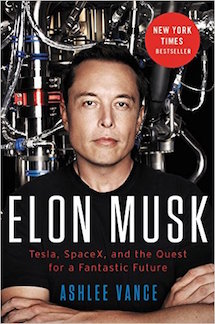
Elon Musk: Tesla, SpaceX, and the Quest for a Fantastic Future
by Ashlee Vance
In Elon Musk: Tesla, SpaceX, and the Quest for a Fantastic Future, veteran technology journalist Ashlee Vance provides the first inside look into the extraordinary life and times of Silicon Valley’s most audacious entrepreneur. Written with exclusive access to Musk, his family and friends, the book traces the entrepreneur’s journey from a rough upbringing in South Africa to the pinnacle of the global business world. Vance spent more than 30 hours in conversation with Musk and interviewed close to 300 people to tell the tumultuous stories of Musk’s world-changing companies: PayPal, Tesla Motors, SpaceX and SolarCity, and to characterize a man who has renewed American industry and sparked new levels of innovation while making plenty of enemies along the way.








